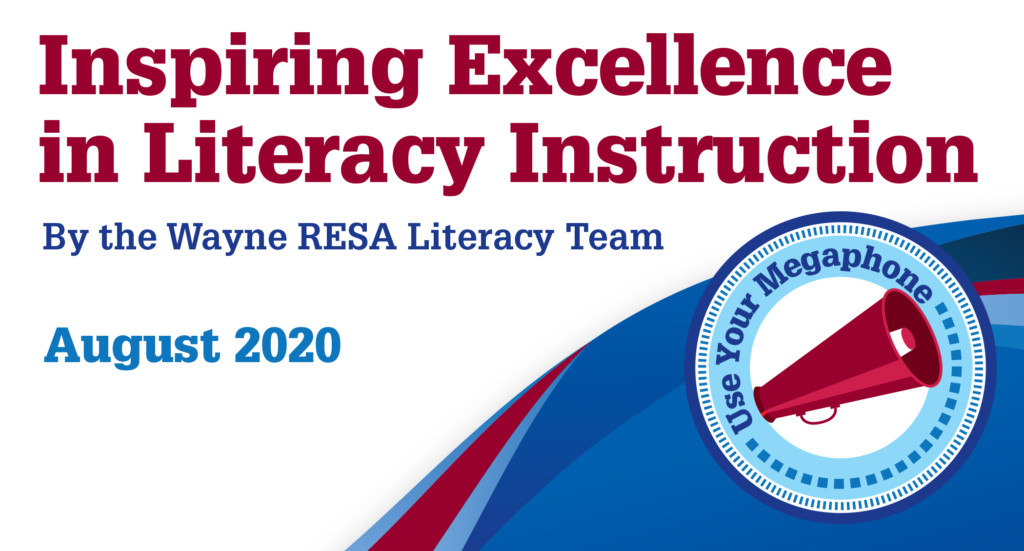
This newsletter has been created by Wayne RESA literacy consultants for literacy educators. In each issue, you will find Literacy Learning Network updates and information, statewide initiative updates, book synopses, teaching and coaching strategies, and upcoming professional learning opportunities. We look forward to partnering with you as we engage in best practices in literacy instruction for all students.
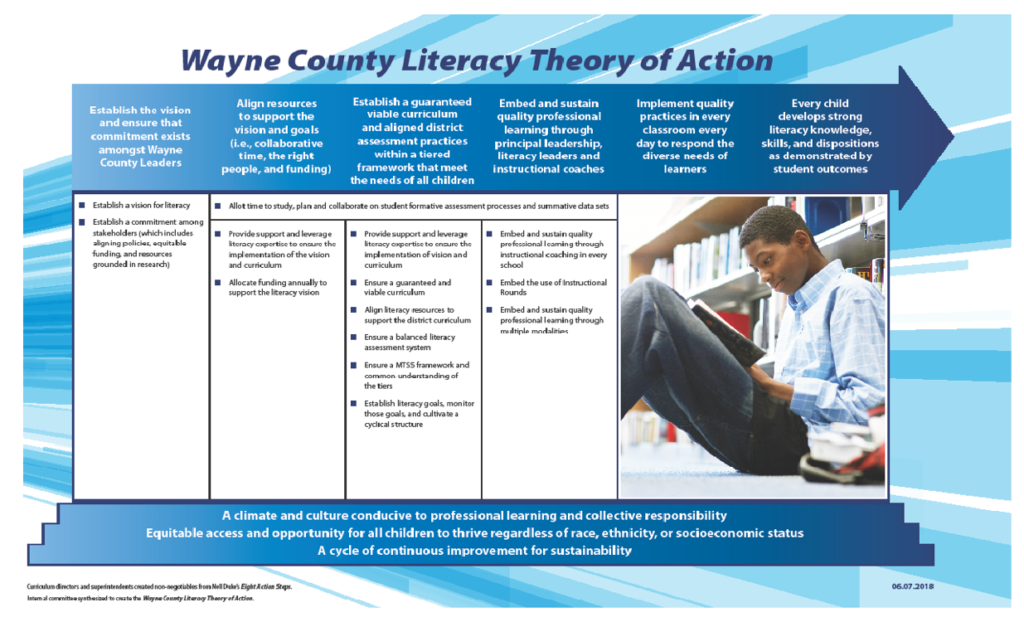
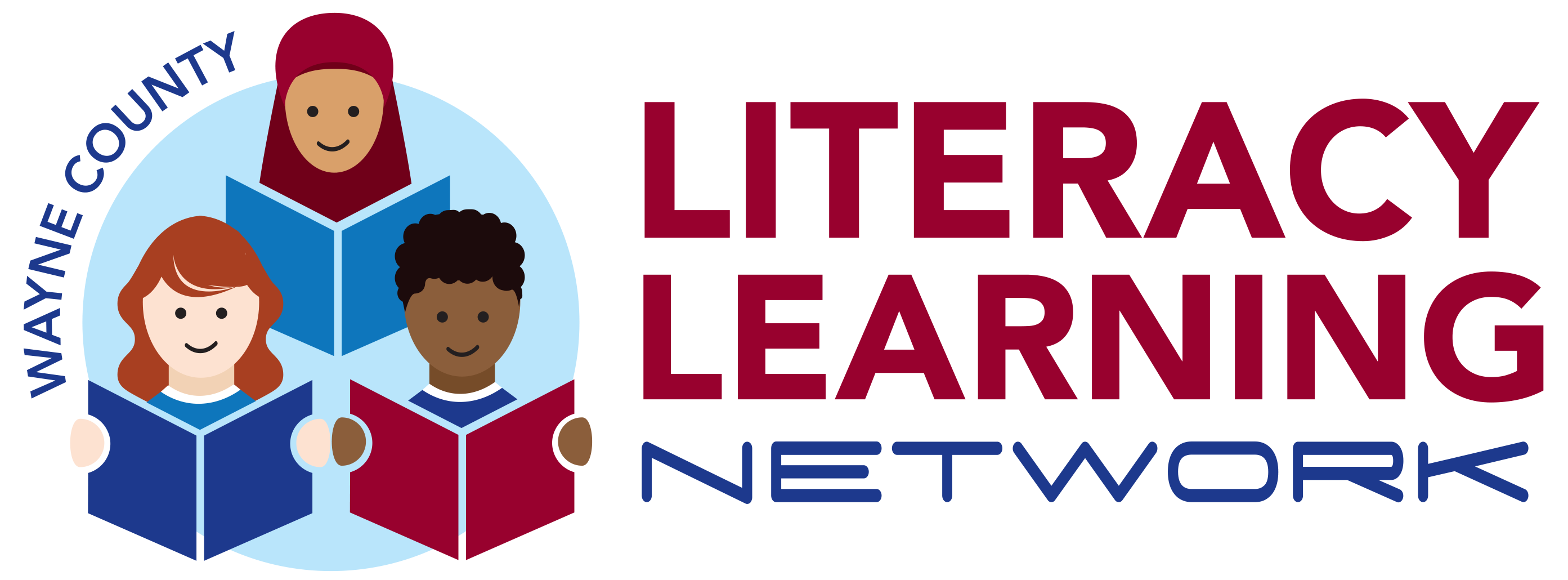
Updates
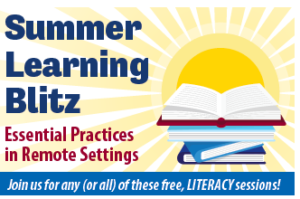
Summer Learning Blitz: A Month of Perfectly Timed Professional Learning
While the beginning of the 2020-2021 school year is still fraught with uncertainty, the need to learn and apply a variety of digital tools and techniques is strong. In response, the Literacy Team established the Summer Learning Blitz. Every day of August (with a few bonus sessions in July), consultants from Wayne RESA have offered and will continue to offer free, one-hour sessions on a variety of literacy-centered topics. Whether you wonder how to build phonological awareness in remote settings or would like more information on using Google tools to enhance writing, there is a session for you. If you find that you are otherwise occupied from 3:00 – 4:00 pm on any given day, we have you covered! By simply registering for the session, you will receive a recording of it. For literacy and instructional coaches, we are offering a follow-up session from 4:00 – 4:30 pm each day to assist with preparation and presentation of these and other professional learning sessions. We look forward to learning with you!
Expanding our Literacy Team's Virtual Presence
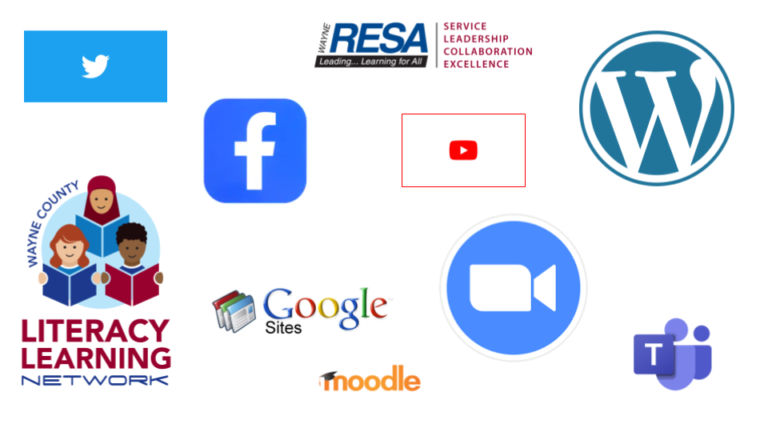
The Wayne RESA Literacy Team has used a variety of digital platforms to connect with literacy educators throughout Wayne County and beyond. However, the unanticipated changes in teaching and learning in recent months have provided an impetus for us to increase our accessibility. While several consultants have their own social media profiles, you can follow us on Twitter and Facebook @WayneRESAELA. In addition, access to pertinent curriculum, instruction and assessment resources can be located within the Literacy pages on Wayne RESAs main site, and additional literacy-focused content can be found on the Literacy Learning Network site. Finally, as we work to develop professional learning in new modalities, we will use Moodle for our asynchronous learning opportunities and primarily Zoom for our synchronous learning opportunities. In continuing to navigate these new realms, we look forward to even more ways to learn and grow alongside you.
Statewide Updates
The Michigan Department of Education is sharing three resources recently created to help schools as they manage the pandemic-related challenges of preparing literacy instruction for the 2020-2021 school year. When seeking expert advice on prioritizing literacy content, the following resources may be helpful:
|
| The GELN Continuity of Learning Task Force has created Asynchronous Professional Learning Maps. Within the catalog, professional learning modules and webinars are coded according to the following categories: Remote Teaching and Learning, Well-Being and Equity. In addition, the Maps include a link to free asynchronous modules offered by a variety of professional organizations. Both resources will be updated as additional professional learning offerings are made available. |
| The 6-12 Disciplinary Literacy Task Force is proud to announce the Disciplinary Literacy Deeper Dive Institute. This professional development series will combine synchronous and asynchronous learning opportunities starting October 2020. Due to popular demand, a second cohort will be formed from the current and growing waitlist. Register today! |
| Registration is now open for the MDE Fall 2020 Virtual Continuous Improvement Conference which will be held on October 20 from 7:30 a.m. to 3:30 p.m. Registration is $125 per participant and includes SCECH credit. Registration will allow the registered participant access to the conference sessions for three weeks following the event. Learn more, register for the conference, and/or see the agenda. |
Books and Strategies
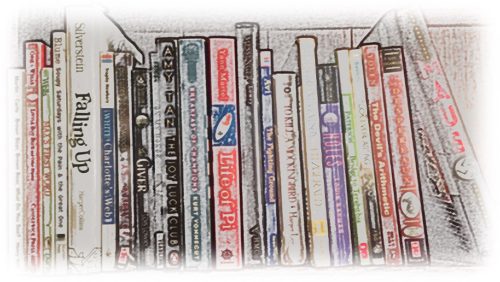
Book Talk
Igniting Passion in Readers of All Ages
Just Like Me
Vanessa Brantley-Newton
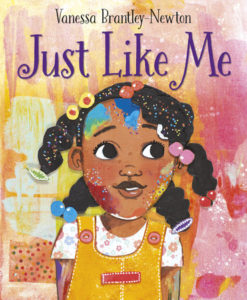 The intricate artwork in Vanessa Brantley-Newton’s newest picture book engages readers with a wide spectrum of girls bent on self-acceptance. The accompanying verses explore identities by looking at both similarities and differences in girls of different ages, cultures and races. The clear message of tolerance is immersed in the unique qualities that each individual girl possesses. As the book closes, “Paper Chains” describes the collective power girls can achieve by coming together.
The intricate artwork in Vanessa Brantley-Newton’s newest picture book engages readers with a wide spectrum of girls bent on self-acceptance. The accompanying verses explore identities by looking at both similarities and differences in girls of different ages, cultures and races. The clear message of tolerance is immersed in the unique qualities that each individual girl possesses. As the book closes, “Paper Chains” describes the collective power girls can achieve by coming together.
Ghost
Jason Reynolds
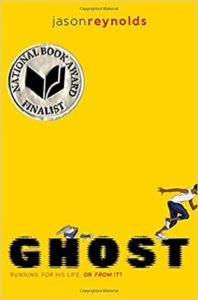 Ghost has had a turbulent and violent past, and as a middle schooler, he is immersed in the typical adolescent woes of bullying and insults. Ghost’s typical reaction has been to fight, which causes even more problems for him, until he begins to run on an elite track team. Running not only gives Ghost an outlet, but he develops important relationships with his teammates and coach, too. Suddenly, Ghost finds himself confronting his issues rather than trying to muscle his way through them.
Ghost has had a turbulent and violent past, and as a middle schooler, he is immersed in the typical adolescent woes of bullying and insults. Ghost’s typical reaction has been to fight, which causes even more problems for him, until he begins to run on an elite track team. Running not only gives Ghost an outlet, but he develops important relationships with his teammates and coach, too. Suddenly, Ghost finds himself confronting his issues rather than trying to muscle his way through them.
Children of Blood and Bone
Tomi Adeyemi
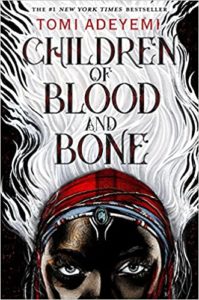
In this first book in the OrÏsha series, readers meet what remains of the Adebola family after magic has been criminalized. Strong-willed and smart, Zélie Adebola decides to fight the ruling of the merciless king by restoring magic to the land. Zélie’s journey is a dangerous one, filled with many obstacles and small victories as she makes her way through a land of fanciful creatures and spirits. Her resilience and strength are compelling, and readers will want to move quickly on to the next book in the series: Children of Virtue and Vengeance.
Before She Was Found
Heather Gudenkauf
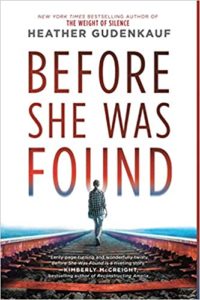 In this mystery thriller, Gudenkauf introduces readers to Cora Landry, a twelve-year-old misfit who longs to connect with her classmates. A school project on urban legends draws Cora’s attention to the tales of Joseph Whither, an alleged murderer from the 1940s. Told from multiple characters’ perspectives, Cora’s year as a seventh grader unfolds, leading to a shocking set of events that leaves readers wondering what actually happened in the train yard on that cold April night to three young girls whose lives will be changed forever.
In this mystery thriller, Gudenkauf introduces readers to Cora Landry, a twelve-year-old misfit who longs to connect with her classmates. A school project on urban legends draws Cora’s attention to the tales of Joseph Whither, an alleged murderer from the 1940s. Told from multiple characters’ perspectives, Cora’s year as a seventh grader unfolds, leading to a shocking set of events that leaves readers wondering what actually happened in the train yard on that cold April night to three young girls whose lives will be changed forever.
Children in Quarantine: The COVID-19 Crisis through the Eyes of the Children that Lived It
Anna Coleman
 Anna Coleman, recent graduate of Plymouth-Canton Community Schools and current University of Alabama student, has poignantly captured the current moment in history through a series of pictures and interviews with children of all ages. As they adjust to life during the global pandemic, her subjects’ short yet candid responses provide a window into the myriad reactions of young people, including isolation, confusion, appreciation, compassion and resilience.
Anna Coleman, recent graduate of Plymouth-Canton Community Schools and current University of Alabama student, has poignantly captured the current moment in history through a series of pictures and interviews with children of all ages. As they adjust to life during the global pandemic, her subjects’ short yet candid responses provide a window into the myriad reactions of young people, including isolation, confusion, appreciation, compassion and resilience.
Cultivating Genius: An Equity Framework for Culturally and Historically Responsive Literacy
Gholdy Muhammad
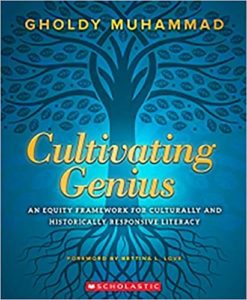 With a moving foreword by Dr. Bettina Love, Dr. Gholdy Muhammad’s three-part book guides readers through an equity framework that emphasizes identity development, intellectual development, skills development and criticality. By relying on the history of literate societies for marginalized groups, she skillfully captures the power and privilege dynamics embedded in literacy learning. To balance these uneven structures, Dr. Muhammad advocates for literacy instruction that celebrates its aesthetic, collaborative, and responsive qualities.
With a moving foreword by Dr. Bettina Love, Dr. Gholdy Muhammad’s three-part book guides readers through an equity framework that emphasizes identity development, intellectual development, skills development and criticality. By relying on the history of literate societies for marginalized groups, she skillfully captures the power and privilege dynamics embedded in literacy learning. To balance these uneven structures, Dr. Muhammad advocates for literacy instruction that celebrates its aesthetic, collaborative, and responsive qualities.
Improving Instructional Practices in Remote Learning Environments
For educators throughout the world, March 2020 will mark a shift in teaching and learning that shocked and strained even the most seasoned teachers and leaders. Remote instruction took many different forms in the months following school closures; regardless, challenges in delivery of content, student engagement, individualized attention, and feedback persisted. While the beginning of the 2020-2021 school year looms in the very near future, there is still time for introspection and taking stock of what we have observed about teaching and learning through this very different lens.
- Organization is key. Students are as new to navigating virtual classrooms as we are. Providing structure to the week or unit means consistency in both asynchronous and synchronous spaces. The Learning Management System (LMS) should be easy for students to follow. For example, weeks can be set up in similar patterns, or assignment submissions can be clearly marked and dated. Similarly, the format of synchronous learning sessions should be framed by established norms that will be adhered to during each meeting. In lieu of anchor charts, use Google Slides or PowerPoint for announcements and reminders.
- Student engagement is possible in digital settings. We can use the Chat feature for whiparounds or “chat flurries.” In addition, non-verbal cues, such as a thumbs up or raised hands, can engage students in the discussion; we can also encourage students’ use of the reactions (i.e., clapping) within a video conferencing platform. Polling students with tools like Mentimeter or Pollseverywhere can provide immediate responses; similarly, we can use virtual whiteboards, such as those within applications like Jamboard or Padlet. Finally, to prevent some students’ worries about their home settings, we create and distribute a template of virtual backgrounds and instructions on how to add them.
- Small group and one-on-one conferences can provide students with individualized attention. Using any video conferencing platform, we can meet with students to discuss assignments, offer suggestions, attend to concerns, and answer questions. We can set up schedules in Google docs or within an online calendar, and students can sign up for meeting times that are convenient for them. Whether formal or informal, these conferences offer both students and teachers a guaranteed checkpoint to monitor progress.
- Timely and specific feedback may be even easier in virtual settings. The comments feature in word processing applications, such as Google docs or Microsoft Word, target areas in students’ writing or collaborative work that need attention. We can also create and link screencasts or audio comments to student work; Screencastify, Screencast-O-Matic, and Vocaroo are just a few possibilities for sending students recorded responses. We can also encourage students to engage in the feedback process by using similar applications (i.e., typed or linked comments) to ask questions, seek clarity, or share revisions.
Change is never easy, especially when there is so little time to prepare. As we learn to adapt to new and unfamiliar digital tools and platforms, we inadvertently model grace and flexibility for our students who are struggling, too. We also illustrate the uncanny ability to see the positive in any situation: “Although the 2019–20 school year didn’t end the way any of us in education predicted or wanted, at the very least, distance learning allowed teachers to explore new online applications that can and will be relevant to our future course delivery in any format” (Gray, 2020).
Noteworthy News
In August, teachers often devote time for cleaning and decorating their classrooms in eager anticipation of the first day of school. While COVID-19 has disrupted many traditions, teachers’ creativity cannot be squelched. To welcome their new students, teachers have created Bitmoji Classrooms and hallways with Bitmoji Lockers. This short video can help you create one of your own!


Professional Learning
| Upcoming Events at Wayne RESA |
| See the Professional Growth pages on the Wayne RESA site for links to course offerings, their descriptions, and online registration. All professional learning sessions will be provided virtually until December 31, 2020. At that time, Wayne RESA will reevaluate delivery platforms that ensure the health and safety of our presenters and participants. If the registration for an event does not indicate an alternative plan for professional learning prior to December 31, please contact any of the Literacy Team members for updated arrangements. |
| Early Literacy |
| Prekindergarten Essential Instructional Practices in Early Literacy: See Cohort Registration and Start Dates Below |
Prekindergarten educators will participate in eight half-day sessions of intense training focused on the MAISA-GELN Essential Instructional Practices in Early Literacy, Prekindergarten. To support Michigan Department of Education’s mission to improve literacy learning equitably across the state, participants will closely examine the ten essential instructional practices that research has shown to be necessary for all Michigan prekindergarten children to demonstrate adequate progress toward literacy. For additional information, contact Debbie Reeves.
|
| Elementary |
| Content Area Literacy in K-5: Researcher’s Workshop Across the Curriculum: April 27 |
| Are you searching for a way to effectively immerse students in the richness and intrigue of content area learning while at the same time supporting their on-going literacy development? Join Stephanie Harvey, world-renowned literacy specialist and best-selling author, for an inspiring day exploring researcher’s workshop—a powerful and authentic instructional approach which adapts the familiar structures of reader’s and writer’s workshop to support students’ engagement and independence as learners. Throughout this workshop, Harvey will address the six cornerstones which foster thoughtful learning, including curiosity, workshop, content, comprehension, collaboration, and environment, which together provide a strong foundation for inquiry at every grade level across the curriculum. Participants will learn how to use researcher’s workshop to create irresistible investigations in science, social studies, and language arts; increase students’ independence and agency by gradually releasing responsibility for inquiry; and effectively integrate literacy and content through strategies for comprehension and critical thinking. All participants will receive a copy of Harvey’s recently released book (coauthored with Anne Goudvis and Brad Buhrow), Inquiry Illuminated: Researcher’s Workshop Across the Curriculum. The intended audience for this workshop includes K-5 classroom teachers, reading specialists, literacy coaches, elementary resource room teachers, and members of the leadership team. For additional information, contact Debbie Reeves. |
| Leveled Literacy Intervention, K-2: December 1 – 2 and March 9 (all three dates online) OR February 1 – 2 and April 14 |
| The Fountas and Pinnell Leveled Literacy Program System (LLI) is a scientifically-based early intervention program designed to prevent literacy difficulties before they turn into long-term challenges. Participants will learn effective small group instructional strategies to provide the intensive support necessary for some primary students to achieve grade level competency in reading and writing. This program also specifically supports the unique needs of English Language Learners. This three-day workshop series will be led by Heinemann Literacy Consultant Dale Severyn, who will share her expertise as a reading specialist and certified Reading Recovery teacher leader. Enrollment in this series is limited to 30 participants, so early registration is recommended. Participants must bring to each session an orange, green, or blue LLI grade level kit (not included in this series). The target audience for this workshop is K-2 Teachers and Literacy Interventionists. For additional information, contact Debbie Reeves. |
| Leveled Literacy Intervention, Grades 3 – 5: December 8 – 9 and March 10 |
| The Fountas and Pinnell Leveled Literacy Program System (LLI) is a scientifically-based early intervention program designed to prevent literacy difficulties before they turn into long-term challenges. Participants will learn effective small group instructional strategies to provide the intensive support necessary for some intermediate students to achieve grade level competency in reading and writing. This program also specifically supports the unique needs of English Language Learners. This three-day workshop series will be led by Heinemann Literacy Consultant Dale Severyn, who will share her expertise as a reading specialist and certified Reading Recovery teacher leader. Enrollment in this series is limited to 30 participants, so early registration is recommended. Participants must bring to each session a red, gold, or purple LLI grade level kit (not included in this series). The intended audience for this series is grades 3-5 teachers and Literacy Interventionists. For additional information, contact Debbie Reeves. |
| Overview of the K-5 GELN Literacy Essentials: October 19 |
| Have you heard the phrase “minimum standard of care?” Are you familiar with how this phrase connects with literacy practices in our K-5 classrooms? If you are curious about these questions and how it can impact your teaching, then this session is for you! Come and learn about the GELN Essential Practices in literacy. In this session, participants will be provided an overview to the K-3 and 4-5 Literacy Essential Practices. Participants will spend time learning about motivation and engagement and the critical role these plays in all aspects of literacy development as well as the other 9 essentials. As each of the 10 essentials is introduced, participants will be given time for reflection and action planning; therefore, school literacy teams and/or grade level teams are encouraged to enroll together. This session could serve as a springboard to build ideas for professional learning linked to school improvement. All participants will receive their own printed copy of the GELN Literacy Essentials for Grades K-3 & 4-5. The intended audience for this session is K-5 teachers, reading specialists, literacy coaches, leadership team members, resource room teachers and grade level/school teams. (This session will focus on K-3 and 4-5 Essential Literacy Practices #1-10.) For additional information, contact Bridget Regan. |
| Storytelling with Digital Media: March 22 |
| Makerspaces encourage teachers to develop interactive opportunities for students as they develop products for a wide range of purposes and audiences. In this workshop, participants will discover ways to inspire active storytellers through digital media that tap into multiple literacies to create meaning. Participants will explore green screens and stop animation, e-book creations, and more. All participants will receive a stop animation starter kit and The Green Screen Maker Space Project Book. The intended audience for this course is K-12 educators. For additional information, contact Laura Gabrion. |
| Secondary |
| Creating Context for Teaching Night: May 10 |
| In collaboration with the Holocaust Museum, Wayne RESA proudly presents Creating Context for Teaching Night by Elie Wiesel. Participants in this course will explore the following learning outcomes: learn how to prepare students to read and understand Night within the larger historical framework of the Holocaust, examine the history of antisemitism to provide context before students read Night, examine Jewish life in Eastern Europe to provide cultural context for Night, explore the use of multimedia assets including using visual history testimonies and other primary sources and materials to support the effective teaching of Night, and discuss and identify themes, life lessons and the current relevance of Night. For additional information, contact Rosalyn Shahid. |
| Culturally Responsive Instruction: Teaching Critical Literacy & Hard History: October 26, November 9, November 23, and December 7 |
| In this four (4) day workshop, participants will gain an in-depth understanding of culturally responsive instruction and how to develop equitable classroom spaces that empower ALL students as learners and emerging citizens. This workshop will help teachers develop an equity lens by discovering and examining their own cultural identity in service of becoming culturally responsive instructors. Using Gholdy Muhammad’s Equity Framework, participants will develop their capacity to understand, develop, and implement culturally responsive lessons that cultivate the genius of ALL students. Culturally Responsive Instruction pursues four goals instructionally by helping students develop their identity, skills, intellect, and criticality. As students engage in culturally responsive instruction, they should demonstrate how that instruction helps them to: 1) Learn something about themselves and/or about others (Identity). 2) Build their skills for the content area they are studying (Skill). 3) Build their knowledge and mental powers (Intellect). 4) Engage their thinking about power and equity and the disruption of oppression (Criticality). Using the content areas of Literacy and Social Studies, teachers will be able to understand and utilize a culturally responsive instructional framework that can be applied to any content area. This workshop will be followed by seminar/practicum cohort Culturally Responsive Instruction (Level 2) which will explore implementation of CRI classroom strategies and practices in the classroom setting. For additional information, contact Virginia Winters. |
| Disciplinary Literacy in Action: November 17, December 9, January 14, and March 18 |
| In this hybrid course, participants will consider how to leverage the specialized aspects of their disciplines to help students learn best. ReLeah Lent, author of Disciplinary Literacy in Action, will share her insights on how to create and maximize units of study “that preserve discipline-specific content yet keep innovative daily practices of reading, writing, thinking, and doing at the forefront.” This course will focus heavily on the “doing” aspect of disciplinary literacy. Through a network approach, participants will unpack Michigan’s newly adopted Essential Practices for Disciplinary Literacy Instruction in the Secondary Classroom: Grades 6 to 12 and uncover what it means to put these practices into action. Educators will take a deep dive into problem-based pedagogy that draws heavily on community networking, business models, and academic conversations. The intended audience for this course is school-based interdisciplinary teams, instructional coaches servicing secondary schools, content area teachers, and anyone who is interested in exploring how to teach middle and high school students more authentically. For additional information, contact Rosalyn Shahid. |
| Instructional Shifts for 8th Grade PSAT 8/9: October 21 (online) OR February 4 (online) |
| This session will review key information for preparing and administering the 8/9 PSAT which replaces the MSTEP for 8th grade Math and English Languages Arts (ELA). We will explore crucial content features for both Math and ELA. Topics include: why the shift; PSAT 8/9 Test Blueprint; test dates and general information; special education accommodations and English language learner supports; test items analysis; ELA instructional shifts; and Math instructional shifts. For additional information, contact Cherron Ramsey. |
| Secondary Literacy Leaders’ Network: October 8 (TBD), December 10 (online), February 11 (online), and April 15 (TBD) |
| In alignment with Michigan’s Action Plan for Literacy Excellence, Wayne RESA has developed a consortium dedicated to the needs of secondary literacy professionals and the students they serve. This professional network will meet quarterly to discuss hot topics in adolescent literacy, legislative updates, and engage in professional learning. Ultimately, the purpose of this group is to draw on the collective wisdom of secondary educators and identify ways to improve secondary literacy instruction throughout Wayne County. The intended audience for this network is instructional coaches serving secondary schools, curriculum coordinators, and language arts instructors serving as lead teachers. For additional information, contact Rosalyn Shahid. |
| Teaching Anne Frank in the ELA Classroom: Context, Choice, and Meaningful Action: April 14 |
| In collaboration with the Holocaust Museum, Wayne RESA proudly presents Teaching Anne Frank in the ELA Classroom: Context, Choice, and Meaningful Action. Participants in this course will explore the following learning outcomes: Understand the historical context within which Anne Frank and her family were living, develop a rationale for teaching Anne Frank, use resources and strategies to meet the unique challenges that arise when teaching Anne Frank that can be used to effectively and responsibly teach about the Holocaust, think critically about complex issues and ideas, understand the importance of choice and responsibility, and learn about different ways of taking meaningful and informed action. The intended audience for this course is language arts and social studies teachers. For additional information, contact Rosalyn Shahid. |
| Coaching |
| Building Coaching Strategies: Entering Into the Conversation: January 25, January 28, and February 10 |
| In this learning series, coaches will explore their current beliefs and how those beliefs might facilitate or debilitate the relationship with a teacher. This training will provide the coaches with knowledge, skills, and dispositions to shift teachers’ thinking from responding, “This is how we have always done it” to considering new possibilities. Coaches will acquire a vast knowledge of effective coaching skills to mediate the thinking of the teachers they coach. This will enable the teachers to think deeply about their practice and to monitor and adjust as necessary. Coaches will understand the link between effective coaching and the transformation of teacher practice. The intended audience is instructional coaches and literacy specialists, though it is appropriate for anyone in an instructional coaching role. For additional information, contact Laura Gabrion. |
| Continuing the Conversation: Sustaining Coaching Skills and Dispositions: March 30 |
| This workshop is a follow-up to the Building Coaching Strategies: Entering into the Conversation series. In this course, participants will explore their adaptations to coaching by considering the implementation of new skills and dispositions, the challenges of working with adult learners, and the value of coaching. Using scenarios to prompt deeper analysis, participants will determine which additional supports might be needed in order to further strengthen their coaching abilities. The intended audience is instructional coaches and literacy specialists, though it is appropriate for anyone in an instructional coaching role. For additional information, contact Laura Gabrion. |
| COSA (Coaches on Special Assignment) Collaborative: September 15 (online), November 17 (online), January 12, and March 16 |
| This collaborative, which is funded through the MDE Coaching Grant and hosted by Wayne RESA, is a review and continuation of the foundational learning that coaches experience during Wayne RESA 3-Day COSA Academy. Its purpose is to provide a space for the COSAs to participate in deep-learning and dialogue about a coach’s role and responsibilities. Opportunities will be offered to unpack and practice the Essential Coaching Practices for Elementary Literacy as well as the Essential Instructional Practices in Elementary Literacy, Grades K-3. The collaborative is operating in conjunction with the Wayne County Coaching Network. Coaches on Special Assignment (COSA) are required to attend both series. For additional information, contact Mary-Lu Strimbel. |
| Wayne County Coaching Network: October 6, December 8, February 9, April 13, and May 11 |
| This network is designed to offer opportunities for deep study of research-based practices using collaborative inquiry (Problems of Practice), common texts, and discussion of the Essential Coaching Practices for Elementary Literacy. Building and sustaining relationships between both teacher-coach and principal-coach roles, developing assessment literacy knowledge and skills, and promoting equity through coaching will be unpacked. Forums led by district coaches and WRESA consultants will provide additional focused learning. The final session of the series will be a celebration of our growth. The intended audience for this course is new or experienced literacy coaches. For additional information, contact Mary-Lu Strimbel. |
| District Leadership |
| Essential School-Wide Practices in Literacy for Leaders: February 11-12, May 1 and May 15, OR May 12-13 |
| This workshop examines how literacy leaders can use their megaphone to advocate and implement organizational practices that create equitable literacy learning for all. This 2-day series will help district literacy leadership teams and building leaders strengthen the organizational practices necessary to ensure that equitable literacy practices are maintained system-wide. The MAISA GELN Essential School-Wide and Center-Wide Practices in Literacy will serve as the guiding document, and the series will include training on effective application of the School-Wide Screener as a driver for systematic change. By the end of the series, participants will have thoughtful, specific, and informed plans for improving literacy instructional support in their schools and throughout the community to reach EVERY child! The audience for this workshop includes individuals and building/district literacy leadership teams committed to the implementation of evidence-based, high quality literacy learning across the learning environment. For additional information, contact Michelle Wagner. |

Resources: Where can I find...
Welcome videos are one way to facilitate classroom introductions, and Animoto makes video editing/sharing easier than ever. Teachers and students can create videos from scratch or use the Templates feature to modify existing videos. 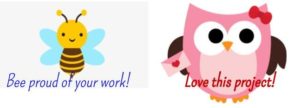
Teachers can use digital stickers to celebrate students’ successes. Using Google Slides, copy and paste clipart into a blank slide, add text, and download the slide as a .jpeg or .png file.
Wayne RESA Literacy Team
Meet Debra Reeves
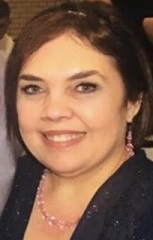
Throughout her professional career, Debra Reeves has dedicated nearly four decades in the support of students, teachers, and administrators as a special and general education classroom teacher, Reading Recovery teacher, district early literacy facilitator, literacy consultant, and current member of the MAISA-GELN Early Literacy Task Force. In her current position as Literacy Consultant for Wayne RESA, Debra’s on-going mission is to increase student literacy achievement by building teacher capacity through high-quality professional development focused on effective, research-based instructional practices in literacy, particularly at the Prekindergarten and Early Elementary levels. Debra holds a Bachelor of Arts in Special Education (with multiple endorsements) from Wayne State University and a Master of Arts in Early Childhood Education (with ZA endorsement) from Eastern Michigan University.
We look forward to hearing from you!
Laura Gabrion
Debbie Reeves
Bridget Regan
Rosalyn Shahid
Mary-Lu Strimbel
Mari Treece
Michelle Wagner
Colleen Whalen
Mellissa Wilson
If this newsletter has been forwarded to you, and you’d like to subscribe to it, please contact Laura Gabrion.
![]() 33500 Van Born Road • Wayne, MI 48184 • 734.334.1300 • 734.334.1620 fax • www.resa.net
33500 Van Born Road • Wayne, MI 48184 • 734.334.1300 • 734.334.1620 fax • www.resa.net
Board of Education
James S. Beri • Mary E. Blackmon • Danielle Funderburg • Lynda S. Jackson • James Petrie
Randy A. Liepa, Ph.D., Superintendent

This newsletter has been created by Wayne RESA literacy consultants for literacy educators. In each issue, you will find Literacy Learning Network updates and information, statewide initiative updates, book synopses, teaching and coaching strategies, and upcoming professional learning opportunities. We look forward to partnering with you as we engage in best practices in literacy instruction for all students.


Updates

Summer Learning Blitz: A Month of Perfectly Timed Professional Learning
While the beginning of the 2020-2021 school year is still fraught with uncertainty, the need to learn and apply a variety of digital tools and techniques is strong. In response, the Literacy Team established the Summer Learning Blitz. Every day of August (with a few bonus sessions in July), consultants from Wayne RESA have offered and will continue to offer free, one-hour sessions on a variety of literacy-centered topics. Whether you wonder how to build phonological awareness in remote settings or would like more information on using Google tools to enhance writing, there is a session for you. If you find that you are otherwise occupied from 3:00 – 4:00 pm on any given day, we have you covered! By simply registering for the session, you will receive a recording of it. For literacy and instructional coaches, we are offering a follow-up session from 4:00 – 4:30 pm each day to assist with preparation and presentation of these and other professional learning sessions. We look forward to learning with you!
Expanding our Literacy Team's Virtual Presence

The Wayne RESA Literacy Team has used a variety of digital platforms to connect with literacy educators throughout Wayne County and beyond. However, the unanticipated changes in teaching and learning in recent months have provided an impetus for us to increase our accessibility. While several consultants have their own social media profiles, you can follow us on Twitter and Facebook @WayneRESAELA. In addition, access to pertinent curriculum, instruction and assessment resources can be located within the Literacy pages on Wayne RESAs main site, and additional literacy-focused content can be found on the Literacy Learning Network site. Finally, as we work to develop professional learning in new modalities, we will use Moodle for our asynchronous learning opportunities and primarily Zoom for our synchronous learning opportunities. In continuing to navigate these new realms, we look forward to even more ways to learn and grow alongside you.
Statewide Updates
The Michigan Department of Education is sharing three resources recently created to help schools as they manage the pandemic-related challenges of preparing literacy instruction for the 2020-2021 school year. When seeking expert advice on prioritizing literacy content, the following resources may be helpful:
|
| The GELN Continuity of Learning Task Force has created Asynchronous Professional Learning Maps. Within the catalog, professional learning modules and webinars are coded according to the following categories: Remote Teaching and Learning, Well-Being and Equity. In addition, the Maps include a link to free asynchronous modules offered by a variety of professional organizations. Both resources will be updated as additional professional learning offerings are made available. |
| The 6-12 Disciplinary Literacy Task Force is proud to announce the Disciplinary Literacy Deeper Dive Institute. This professional development series will combine synchronous and asynchronous learning opportunities starting October 2020. Due to popular demand, a second cohort will be formed from the current and growing waitlist. Register today! |
| Registration is now open for the MDE Fall 2020 Virtual Continuous Improvement Conference which will be held on October 20 from 7:30 a.m. to 3:30 p.m. Registration is $125 per participant and includes SCECH credit. Registration will allow the registered participant access to the conference sessions for three weeks following the event. Learn more, register for the conference, and/or see the agenda. |
Books and Strategies

Book Talk
Igniting Passion in Readers of All Ages
Just Like Me
Vanessa Brantley-Newton
 The intricate artwork in Vanessa Brantley-Newton’s newest picture book engages readers with a wide spectrum of girls bent on self-acceptance. The accompanying verses explore identities by looking at both similarities and differences in girls of different ages, cultures and races. The clear message of tolerance is immersed in the unique qualities that each individual girl possesses. As the book closes, “Paper Chains” describes the collective power girls can achieve by coming together.
The intricate artwork in Vanessa Brantley-Newton’s newest picture book engages readers with a wide spectrum of girls bent on self-acceptance. The accompanying verses explore identities by looking at both similarities and differences in girls of different ages, cultures and races. The clear message of tolerance is immersed in the unique qualities that each individual girl possesses. As the book closes, “Paper Chains” describes the collective power girls can achieve by coming together.
Ghost
Jason Reynolds
 Ghost has had a turbulent and violent past, and as a middle schooler, he is immersed in the typical adolescent woes of bullying and insults. Ghost’s typical reaction has been to fight, which causes even more problems for him, until he begins to run on an elite track team. Running not only gives Ghost an outlet, but he develops important relationships with his teammates and coach, too. Suddenly, Ghost finds himself confronting his issues rather than trying to muscle his way through them.
Ghost has had a turbulent and violent past, and as a middle schooler, he is immersed in the typical adolescent woes of bullying and insults. Ghost’s typical reaction has been to fight, which causes even more problems for him, until he begins to run on an elite track team. Running not only gives Ghost an outlet, but he develops important relationships with his teammates and coach, too. Suddenly, Ghost finds himself confronting his issues rather than trying to muscle his way through them.
Children of Blood and Bone
Tomi Adeyemi

In this first book in the OrÏsha series, readers meet what remains of the Adebola family after magic has been criminalized. Strong-willed and smart, Zélie Adebola decides to fight the ruling of the merciless king by restoring magic to the land. Zélie’s journey is a dangerous one, filled with many obstacles and small victories as she makes her way through a land of fanciful creatures and spirits. Her resilience and strength are compelling, and readers will want to move quickly on to the next book in the series: Children of Virtue and Vengeance.
Before She Was Found
Heather Gudenkauf
 In this mystery thriller, Gudenkauf introduces readers to Cora Landry, a twelve-year-old misfit who longs to connect with her classmates. A school project on urban legends draws Cora’s attention to the tales of Joseph Whither, an alleged murderer from the 1940s. Told from multiple characters’ perspectives, Cora’s year as a seventh grader unfolds, leading to a shocking set of events that leaves readers wondering what actually happened in the train yard on that cold April night to three young girls whose lives will be changed forever.
In this mystery thriller, Gudenkauf introduces readers to Cora Landry, a twelve-year-old misfit who longs to connect with her classmates. A school project on urban legends draws Cora’s attention to the tales of Joseph Whither, an alleged murderer from the 1940s. Told from multiple characters’ perspectives, Cora’s year as a seventh grader unfolds, leading to a shocking set of events that leaves readers wondering what actually happened in the train yard on that cold April night to three young girls whose lives will be changed forever.
Children in Quarantine: The COVID-19 Crisis through the Eyes of the Children that Lived It
Anna Coleman
 Anna Coleman, recent graduate of Plymouth-Canton Community Schools and current University of Alabama student, has poignantly captured the current moment in history through a series of pictures and interviews with children of all ages. As they adjust to life during the global pandemic, her subjects’ short yet candid responses provide a window into the myriad reactions of young people, including isolation, confusion, appreciation, compassion and resilience.
Anna Coleman, recent graduate of Plymouth-Canton Community Schools and current University of Alabama student, has poignantly captured the current moment in history through a series of pictures and interviews with children of all ages. As they adjust to life during the global pandemic, her subjects’ short yet candid responses provide a window into the myriad reactions of young people, including isolation, confusion, appreciation, compassion and resilience.
Cultivating Genius: An Equity Framework for Culturally and Historically Responsive Literacy
Gholdy Muhammad
 With a moving foreword by Dr. Bettina Love, Dr. Gholdy Muhammad’s three-part book guides readers through an equity framework that emphasizes identity development, intellectual development, skills development and criticality. By relying on the history of literate societies for marginalized groups, she skillfully captures the power and privilege dynamics embedded in literacy learning. To balance these uneven structures, Dr. Muhammad advocates for literacy instruction that celebrates its aesthetic, collaborative, and responsive qualities.
With a moving foreword by Dr. Bettina Love, Dr. Gholdy Muhammad’s three-part book guides readers through an equity framework that emphasizes identity development, intellectual development, skills development and criticality. By relying on the history of literate societies for marginalized groups, she skillfully captures the power and privilege dynamics embedded in literacy learning. To balance these uneven structures, Dr. Muhammad advocates for literacy instruction that celebrates its aesthetic, collaborative, and responsive qualities.
Improving Instructional Practices in Remote Learning Environments
For educators throughout the world, March 2020 will mark a shift in teaching and learning that shocked and strained even the most seasoned teachers and leaders. Remote instruction took many different forms in the months following school closures; regardless, challenges in delivery of content, student engagement, individualized attention, and feedback persisted. While the beginning of the 2020-2021 school year looms in the very near future, there is still time for introspection and taking stock of what we have observed about teaching and learning through this very different lens.
- Organization is key. Students are as new to navigating virtual classrooms as we are. Providing structure to the week or unit means consistency in both asynchronous and synchronous spaces. The Learning Management System (LMS) should be easy for students to follow. For example, weeks can be set up in similar patterns, or assignment submissions can be clearly marked and dated. Similarly, the format of synchronous learning sessions should be framed by established norms that will be adhered to during each meeting. In lieu of anchor charts, use Google Slides or PowerPoint for announcements and reminders.
- Student engagement is possible in digital settings. We can use the Chat feature for whiparounds or “chat flurries.” In addition, non-verbal cues, such as a thumbs up or raised hands, can engage students in the discussion; we can also encourage students’ use of the reactions (i.e., clapping) within a video conferencing platform. Polling students with tools like Mentimeter or Pollseverywhere can provide immediate responses; similarly, we can use virtual whiteboards, such as those within applications like Jamboard or Padlet. Finally, to prevent some students’ worries about their home settings, we create and distribute a template of virtual backgrounds and instructions on how to add them.
- Small group and one-on-one conferences can provide students with individualized attention. Using any video conferencing platform, we can meet with students to discuss assignments, offer suggestions, attend to concerns, and answer questions. We can set up schedules in Google docs or within an online calendar, and students can sign up for meeting times that are convenient for them. Whether formal or informal, these conferences offer both students and teachers a guaranteed checkpoint to monitor progress.
- Timely and specific feedback may be even easier in virtual settings. The comments feature in word processing applications, such as Google docs or Microsoft Word, target areas in students’ writing or collaborative work that need attention. We can also create and link screencasts or audio comments to student work; Screencastify, Screencast-O-Matic, and Vocaroo are just a few possibilities for sending students recorded responses. We can also encourage students to engage in the feedback process by using similar applications (i.e., typed or linked comments) to ask questions, seek clarity, or share revisions.
Change is never easy, especially when there is so little time to prepare. As we learn to adapt to new and unfamiliar digital tools and platforms, we inadvertently model grace and flexibility for our students who are struggling, too. We also illustrate the uncanny ability to see the positive in any situation: “Although the 2019–20 school year didn’t end the way any of us in education predicted or wanted, at the very least, distance learning allowed teachers to explore new online applications that can and will be relevant to our future course delivery in any format” (Gray, 2020).
Noteworthy News
In August, teachers often devote time for cleaning and decorating their classrooms in eager anticipation of the first day of school. While COVID-19 has disrupted many traditions, teachers’ creativity cannot be squelched. To welcome their new students, teachers have created Bitmoji Classrooms and hallways with Bitmoji Lockers. This short video can help you create one of your own!


Professional Learning
| Upcoming Events at Wayne RESA |
| See the Professional Growth pages on the Wayne RESA site for links to course offerings, their descriptions, and online registration. All professional learning sessions will be provided virtually until December 31, 2020. At that time, Wayne RESA will reevaluate delivery platforms that ensure the health and safety of our presenters and participants. If the registration for an event does not indicate an alternative plan for professional learning prior to December 31, please contact any of the Literacy Team members for updated arrangements. |
| Early Literacy |
| Prekindergarten Essential Instructional Practices in Early Literacy: See Cohort Registration and Start Dates Below |
Prekindergarten educators will participate in eight half-day sessions of intense training focused on the MAISA-GELN Essential Instructional Practices in Early Literacy, Prekindergarten. To support Michigan Department of Education’s mission to improve literacy learning equitably across the state, participants will closely examine the ten essential instructional practices that research has shown to be necessary for all Michigan prekindergarten children to demonstrate adequate progress toward literacy. For additional information, contact Debbie Reeves.
|
| Elementary |
| Content Area Literacy in K-5: Researcher’s Workshop Across the Curriculum: April 27 |
| Are you searching for a way to effectively immerse students in the richness and intrigue of content area learning while at the same time supporting their on-going literacy development? Join Stephanie Harvey, world-renowned literacy specialist and best-selling author, for an inspiring day exploring researcher’s workshop—a powerful and authentic instructional approach which adapts the familiar structures of reader’s and writer’s workshop to support students’ engagement and independence as learners. Throughout this workshop, Harvey will address the six cornerstones which foster thoughtful learning, including curiosity, workshop, content, comprehension, collaboration, and environment, which together provide a strong foundation for inquiry at every grade level across the curriculum. Participants will learn how to use researcher’s workshop to create irresistible investigations in science, social studies, and language arts; increase students’ independence and agency by gradually releasing responsibility for inquiry; and effectively integrate literacy and content through strategies for comprehension and critical thinking. All participants will receive a copy of Harvey’s recently released book (coauthored with Anne Goudvis and Brad Buhrow), Inquiry Illuminated: Researcher’s Workshop Across the Curriculum. The intended audience for this workshop includes K-5 classroom teachers, reading specialists, literacy coaches, elementary resource room teachers, and members of the leadership team. For additional information, contact Debbie Reeves. |
| Leveled Literacy Intervention, K-2: December 1 – 2 and March 9 (all three dates online) OR February 1 – 2 and April 14 |
| The Fountas and Pinnell Leveled Literacy Program System (LLI) is a scientifically-based early intervention program designed to prevent literacy difficulties before they turn into long-term challenges. Participants will learn effective small group instructional strategies to provide the intensive support necessary for some primary students to achieve grade level competency in reading and writing. This program also specifically supports the unique needs of English Language Learners. This three-day workshop series will be led by Heinemann Literacy Consultant Dale Severyn, who will share her expertise as a reading specialist and certified Reading Recovery teacher leader. Enrollment in this series is limited to 30 participants, so early registration is recommended. Participants must bring to each session an orange, green, or blue LLI grade level kit (not included in this series). The target audience for this workshop is K-2 Teachers and Literacy Interventionists. For additional information, contact Debbie Reeves. |
| Leveled Literacy Intervention, Grades 3 – 5: December 8 – 9 and March 10 |
| The Fountas and Pinnell Leveled Literacy Program System (LLI) is a scientifically-based early intervention program designed to prevent literacy difficulties before they turn into long-term challenges. Participants will learn effective small group instructional strategies to provide the intensive support necessary for some intermediate students to achieve grade level competency in reading and writing. This program also specifically supports the unique needs of English Language Learners. This three-day workshop series will be led by Heinemann Literacy Consultant Dale Severyn, who will share her expertise as a reading specialist and certified Reading Recovery teacher leader. Enrollment in this series is limited to 30 participants, so early registration is recommended. Participants must bring to each session a red, gold, or purple LLI grade level kit (not included in this series). The intended audience for this series is grades 3-5 teachers and Literacy Interventionists. For additional information, contact Debbie Reeves. |
| Overview of the K-5 GELN Literacy Essentials: October 19 |
| Have you heard the phrase “minimum standard of care?” Are you familiar with how this phrase connects with literacy practices in our K-5 classrooms? If you are curious about these questions and how it can impact your teaching, then this session is for you! Come and learn about the GELN Essential Practices in literacy. In this session, participants will be provided an overview to the K-3 and 4-5 Literacy Essential Practices. Participants will spend time learning about motivation and engagement and the critical role these plays in all aspects of literacy development as well as the other 9 essentials. As each of the 10 essentials is introduced, participants will be given time for reflection and action planning; therefore, school literacy teams and/or grade level teams are encouraged to enroll together. This session could serve as a springboard to build ideas for professional learning linked to school improvement. All participants will receive their own printed copy of the GELN Literacy Essentials for Grades K-3 & 4-5. The intended audience for this session is K-5 teachers, reading specialists, literacy coaches, leadership team members, resource room teachers and grade level/school teams. (This session will focus on K-3 and 4-5 Essential Literacy Practices #1-10.) For additional information, contact Bridget Regan. |
| Storytelling with Digital Media: March 22 |
| Makerspaces encourage teachers to develop interactive opportunities for students as they develop products for a wide range of purposes and audiences. In this workshop, participants will discover ways to inspire active storytellers through digital media that tap into multiple literacies to create meaning. Participants will explore green screens and stop animation, e-book creations, and more. All participants will receive a stop animation starter kit and The Green Screen Maker Space Project Book. The intended audience for this course is K-12 educators. For additional information, contact Laura Gabrion. |
| Secondary |
| Creating Context for Teaching Night: May 10 |
| In collaboration with the Holocaust Museum, Wayne RESA proudly presents Creating Context for Teaching Night by Elie Wiesel. Participants in this course will explore the following learning outcomes: learn how to prepare students to read and understand Night within the larger historical framework of the Holocaust, examine the history of antisemitism to provide context before students read Night, examine Jewish life in Eastern Europe to provide cultural context for Night, explore the use of multimedia assets including using visual history testimonies and other primary sources and materials to support the effective teaching of Night, and discuss and identify themes, life lessons and the current relevance of Night. For additional information, contact Rosalyn Shahid. |
| Culturally Responsive Instruction: Teaching Critical Literacy & Hard History: October 26, November 9, November 23, and December 7 |
| In this four (4) day workshop, participants will gain an in-depth understanding of culturally responsive instruction and how to develop equitable classroom spaces that empower ALL students as learners and emerging citizens. This workshop will help teachers develop an equity lens by discovering and examining their own cultural identity in service of becoming culturally responsive instructors. Using Gholdy Muhammad’s Equity Framework, participants will develop their capacity to understand, develop, and implement culturally responsive lessons that cultivate the genius of ALL students. Culturally Responsive Instruction pursues four goals instructionally by helping students develop their identity, skills, intellect, and criticality. As students engage in culturally responsive instruction, they should demonstrate how that instruction helps them to: 1) Learn something about themselves and/or about others (Identity). 2) Build their skills for the content area they are studying (Skill). 3) Build their knowledge and mental powers (Intellect). 4) Engage their thinking about power and equity and the disruption of oppression (Criticality). Using the content areas of Literacy and Social Studies, teachers will be able to understand and utilize a culturally responsive instructional framework that can be applied to any content area. This workshop will be followed by seminar/practicum cohort Culturally Responsive Instruction (Level 2) which will explore implementation of CRI classroom strategies and practices in the classroom setting. For additional information, contact Virginia Winters. |
| Disciplinary Literacy in Action: November 17, December 9, January 14, and March 18 |
| In this hybrid course, participants will consider how to leverage the specialized aspects of their disciplines to help students learn best. ReLeah Lent, author of Disciplinary Literacy in Action, will share her insights on how to create and maximize units of study “that preserve discipline-specific content yet keep innovative daily practices of reading, writing, thinking, and doing at the forefront.” This course will focus heavily on the “doing” aspect of disciplinary literacy. Through a network approach, participants will unpack Michigan’s newly adopted Essential Practices for Disciplinary Literacy Instruction in the Secondary Classroom: Grades 6 to 12 and uncover what it means to put these practices into action. Educators will take a deep dive into problem-based pedagogy that draws heavily on community networking, business models, and academic conversations. The intended audience for this course is school-based interdisciplinary teams, instructional coaches servicing secondary schools, content area teachers, and anyone who is interested in exploring how to teach middle and high school students more authentically. For additional information, contact Rosalyn Shahid. |
| Instructional Shifts for 8th Grade PSAT 8/9: October 21 (online) OR February 4 (online) |
| This session will review key information for preparing and administering the 8/9 PSAT which replaces the MSTEP for 8th grade Math and English Languages Arts (ELA). We will explore crucial content features for both Math and ELA. Topics include: why the shift; PSAT 8/9 Test Blueprint; test dates and general information; special education accommodations and English language learner supports; test items analysis; ELA instructional shifts; and Math instructional shifts. For additional information, contact Cherron Ramsey. |
| Secondary Literacy Leaders’ Network: October 8 (TBD), December 10 (online), February 11 (online), and April 15 (TBD) |
| In alignment with Michigan’s Action Plan for Literacy Excellence, Wayne RESA has developed a consortium dedicated to the needs of secondary literacy professionals and the students they serve. This professional network will meet quarterly to discuss hot topics in adolescent literacy, legislative updates, and engage in professional learning. Ultimately, the purpose of this group is to draw on the collective wisdom of secondary educators and identify ways to improve secondary literacy instruction throughout Wayne County. The intended audience for this network is instructional coaches serving secondary schools, curriculum coordinators, and language arts instructors serving as lead teachers. For additional information, contact Rosalyn Shahid. |
| Teaching Anne Frank in the ELA Classroom: Context, Choice, and Meaningful Action: April 14 |
| In collaboration with the Holocaust Museum, Wayne RESA proudly presents Teaching Anne Frank in the ELA Classroom: Context, Choice, and Meaningful Action. Participants in this course will explore the following learning outcomes: Understand the historical context within which Anne Frank and her family were living, develop a rationale for teaching Anne Frank, use resources and strategies to meet the unique challenges that arise when teaching Anne Frank that can be used to effectively and responsibly teach about the Holocaust, think critically about complex issues and ideas, understand the importance of choice and responsibility, and learn about different ways of taking meaningful and informed action. The intended audience for this course is language arts and social studies teachers. For additional information, contact Rosalyn Shahid. |
| Coaching |
| Building Coaching Strategies: Entering Into the Conversation: January 25, January 28, and February 10 |
| In this learning series, coaches will explore their current beliefs and how those beliefs might facilitate or debilitate the relationship with a teacher. This training will provide the coaches with knowledge, skills, and dispositions to shift teachers’ thinking from responding, “This is how we have always done it” to considering new possibilities. Coaches will acquire a vast knowledge of effective coaching skills to mediate the thinking of the teachers they coach. This will enable the teachers to think deeply about their practice and to monitor and adjust as necessary. Coaches will understand the link between effective coaching and the transformation of teacher practice. The intended audience is instructional coaches and literacy specialists, though it is appropriate for anyone in an instructional coaching role. For additional information, contact Laura Gabrion. |
| Continuing the Conversation: Sustaining Coaching Skills and Dispositions: March 30 |
| This workshop is a follow-up to the Building Coaching Strategies: Entering into the Conversation series. In this course, participants will explore their adaptations to coaching by considering the implementation of new skills and dispositions, the challenges of working with adult learners, and the value of coaching. Using scenarios to prompt deeper analysis, participants will determine which additional supports might be needed in order to further strengthen their coaching abilities. The intended audience is instructional coaches and literacy specialists, though it is appropriate for anyone in an instructional coaching role. For additional information, contact Laura Gabrion. |
| COSA (Coaches on Special Assignment) Collaborative: September 15 (online), November 17 (online), January 12, and March 16 |
| This collaborative, which is funded through the MDE Coaching Grant and hosted by Wayne RESA, is a review and continuation of the foundational learning that coaches experience during Wayne RESA 3-Day COSA Academy. Its purpose is to provide a space for the COSAs to participate in deep-learning and dialogue about a coach’s role and responsibilities. Opportunities will be offered to unpack and practice the Essential Coaching Practices for Elementary Literacy as well as the Essential Instructional Practices in Elementary Literacy, Grades K-3. The collaborative is operating in conjunction with the Wayne County Coaching Network. Coaches on Special Assignment (COSA) are required to attend both series. For additional information, contact Mary-Lu Strimbel. |
| Wayne County Coaching Network: October 6, December 8, February 9, April 13, and May 11 |
| This network is designed to offer opportunities for deep study of research-based practices using collaborative inquiry (Problems of Practice), common texts, and discussion of the Essential Coaching Practices for Elementary Literacy. Building and sustaining relationships between both teacher-coach and principal-coach roles, developing assessment literacy knowledge and skills, and promoting equity through coaching will be unpacked. Forums led by district coaches and WRESA consultants will provide additional focused learning. The final session of the series will be a celebration of our growth. The intended audience for this course is new or experienced literacy coaches. For additional information, contact Mary-Lu Strimbel. |
| District Leadership |
| Essential School-Wide Practices in Literacy for Leaders: February 11-12, May 1 and May 15, OR May 12-13 |
| This workshop examines how literacy leaders can use their megaphone to advocate and implement organizational practices that create equitable literacy learning for all. This 2-day series will help district literacy leadership teams and building leaders strengthen the organizational practices necessary to ensure that equitable literacy practices are maintained system-wide. The MAISA GELN Essential School-Wide and Center-Wide Practices in Literacy will serve as the guiding document, and the series will include training on effective application of the School-Wide Screener as a driver for systematic change. By the end of the series, participants will have thoughtful, specific, and informed plans for improving literacy instructional support in their schools and throughout the community to reach EVERY child! The audience for this workshop includes individuals and building/district literacy leadership teams committed to the implementation of evidence-based, high quality literacy learning across the learning environment. For additional information, contact Michelle Wagner. |

Resources: Where can I find...
Welcome videos are one way to facilitate classroom introductions, and Animoto makes video editing/sharing easier than ever. Teachers and students can create videos from scratch or use the Templates feature to modify existing videos. 
Teachers can use digital stickers to celebrate students’ successes. Using Google Slides, copy and paste clipart into a blank slide, add text, and download the slide as a .jpeg or .png file.
Wayne RESA Literacy Team
Meet Debra Reeves

Throughout her professional career, Debra Reeves has dedicated nearly four decades in the support of students, teachers, and administrators as a special and general education classroom teacher, Reading Recovery teacher, district early literacy facilitator, literacy consultant, and current member of the MAISA-GELN Early Literacy Task Force. In her current position as Literacy Consultant for Wayne RESA, Debra’s on-going mission is to increase student literacy achievement by building teacher capacity through high-quality professional development focused on effective, research-based instructional practices in literacy, particularly at the Prekindergarten and Early Elementary levels. Debra holds a Bachelor of Arts in Special Education (with multiple endorsements) from Wayne State University and a Master of Arts in Early Childhood Education (with ZA endorsement) from Eastern Michigan University.
We look forward to hearing from you!
Laura Gabrion
Debbie Reeves
Bridget Regan
Rosalyn Shahid
Mary-Lu Strimbel
Mari Treece
Michelle Wagner
Colleen Whalen
Mellissa Wilson
If this newsletter has been forwarded to you, and you’d like to subscribe to it, please contact Laura Gabrion.
![]() 33500 Van Born Road • Wayne, MI 48184 • 734.334.1300 • 734.334.1620 fax • www.resa.net
33500 Van Born Road • Wayne, MI 48184 • 734.334.1300 • 734.334.1620 fax • www.resa.net
Board of Education
James S. Beri • Mary E. Blackmon • Danielle Funderburg • Lynda S. Jackson • James Petrie
Randy A. Liepa, Ph.D., Superintendent
“Use Your Megaphone”: Inspiring Excellence in Literacy Instruction Read More »